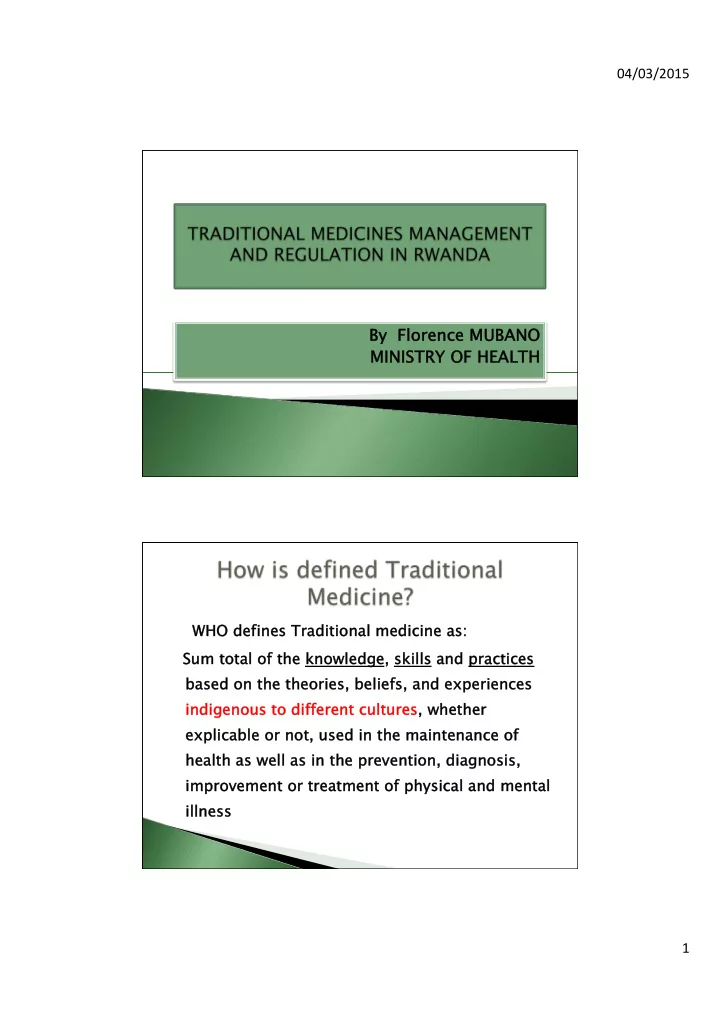

04/03/2015 ¡ By Floren By Florence MUBANO ce MUBANO MINISTRY Y OF HEA EALTH WHO defines Traditi tional medicine as: Sum to tota tal of th the kn know owledg ledge, , sk skills ills an and d practi tices based on th the th theories, beliefs, and experiences indigenous to to different t cultu tures, wheth ther explicable or not, t, used in th the mainte tenance of health th as well as in th the preventi tion, diagnosis, improvement t or tr treatm tment t of physical and menta tal illness illn ess 1 ¡
04/03/2015 ¡ } Rwandan tr traditi tional medicine is th the Rwandan indigenous syste tem of health th care and th therefore cannot t be an alte ternati tive, } The te term “African tr traditi tional medicine" is not t synonymous with th "Alte ternati tive and complementa tary medicine" which is a misnomer which is someti times use used. } Despite the use of traditional medicines for many centuries, challenges regarding the safety, efficacy and quality of traditional medicines exist, and the development of traditional medicine varies widely in different countries of the Region. } That is why efforts must be redoubled to evaluate the safety, efficacy and quality of traditional medicines used in the treatment of the selected priority diseases as well as to regulate and streamline the activities of THPs in the Region 2 ¡
04/03/2015 ¡ } WHO estimates that about 80% of the population in developing countries still depend on traditional medicine for their PHC needs, } TM was officially recognized in 1978 by the Alma-Ata Declaration on PHC as important resource in achieving health for all in 2000 } Since then, a number of resolutions and declarations have been adopted by governments, governing bodies at regional and global levels( Rusaka Ethiopia ) } The fiftieth session of the WHO Regional Committee for Africa, held in Ouagadougou in 2000, adopted by the regional strategy by its resolution AFR /RC 50/R3 on promoting the role of traditional medicine in health systems, } WHO developed the Regional Strategy to promote the institutionalisation of Traditional Medicine and its integration in health systems, } WHO developed different guideline to assure the quality of practices and medicines and their use. 3 ¡
04/03/2015 ¡ } Policy documents; } Strategic plan for its implementation which includes: • Capacity building; • Research promotion; • Development of local production, including cultivation of medicinal plants; • Protection of intellectual property rights and indigenous knowledge } Legal framework of traditional Medicine practice, } Code of ethics of traditional healers /practitioners The Basic Instruments developed (Drafts) are: Ø 1. The national policy on TM which s et out national traditional medicine challenges and propose strategies and plans to monitor key components of the policy implementation within the context of national health policy. Ø 2. The Legal framework for Traditional Medicine Practitioners to p provide the establishment of a Traditional Health Practitioners Council, a multidisciplinary body that will be responsible for regulating the practice of traditional medicine. 4 ¡
04/03/2015 ¡ The Basic Instruments developed (Drafts) are: 3. The Codes of Ethics & Practice ◦ Includes a code of ethics & practice, disciplinary procedures and minimum standards for the practice of traditional medicine in Rwanda; ◦ Ensures effective utilization of traditional health practitioners for primary health care delivery and regulates their practice 4. Strategic Plan for implementation which should translate the policy in actions. } Validation of all institutionalisation documents } Develop their implementation framework, } Develop the operational plans to implement the strategic plan 5 ¡
04/03/2015 ¡ 6 ¡
Recommend
More recommend